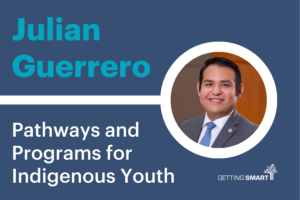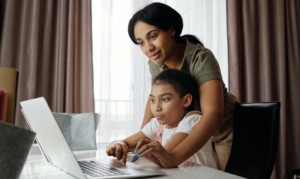Parents Are First Line of Defense In Preventing “Summer Learning Loss”


With summer fast approaching, now is the time for parents to start planning ways to keep their children’s minds and bodies active during their vacation months.
Why? Over 100 years (yes, one hundred) of research has documented the occurrence of “summer learning loss,” a loss in academic skills and knowledge during the summer months that sets students back academically if they are not engaged in meaningful formal or informal summer learning and enrichment activities.
It’s also well-documented that summer learning loss, which is cumulative over time, contributes directly to a widening of the achievement gap between low-income and middle-income students, and that a lack of summer learning opportunities also contributes to increased student drop-out rates.
Moreover, children who don’t take part in summer learning programs disproportionately gain weight in summer because they lack access to the recreational and meal programs available during the school year and spend more time watching TV and being sedentary, thus increasing their risk of childhood obesity.
That’s the bad news about why summer matters. The good news is there are some simple, effective and affordable ways for parents to prevent summer learning loss and engage their children in meaningful summertime learning activities that cost nothing (or next to nothing) and will help keep them mentally and physically fit, and ready to start the new school year with success.
While summer camps and formal summer learning programs certainly offer opportunities for enriching activities, there are also plenty of effective, and cost-effective, ways to support your child’s summertime learning. Here are four simple DIY ways to get started.
TALK to your child’s teacher before the end of the school year. Teachers will have good ideas about workbooks, activities and even online resources that children can do to maintain their skills over the summer.
READ to, and with, your kids. Take advantage of your local public library and their summer reading programs. You’ll get all the books you want for free and your kids will enjoy a field trip that’s likely to help instill a love of reading.
TURN everyday activities into learning opportunities. For example, take your kids on a shopping trip and challenge them to add up prices at the store and see if they can tally up the final bill. Going on a drive? Ask them to look out for certain shapes, colors, letters or words on billboards and signs.
ESCAPE the TV, couch and fridge by getting out and about for neighborhood walks and outings to local parks, playgrounds, zoos, community centers and other local resources that are enjoyable, educational and keep everyone moving.
Try these activities, plus some more of your own, and you’ll see firsthand why summer matters to your child’s mental and physical health and well-being, and how a little enrichment can make a big difference.
Jennifer Peck (www.huffingtonpost.com/jennifer-peck) was a founding staff member of the Partnership for Children and Youth (www.partnerforchildren.org) in 2001 and became its executive director in 2003. Since then, she has lead initiatives to finance and build after-school and summer-learning programs, and increase access to school meals and nutrition education programs in the Bay Area’s lowest-income communities. Under her leadership, the Partnership has brought more than $70 million in public funding to schools and their community partners, enabling thousands of low-income children to participate in these programs, and has played an influential role in policy-development and advocacy to improve the effectiveness of public funding for youth programs in low-income communities across California.
In December 2010, Jennifer was appointed Senior Policy Advisor and Transition Team Director for Tom Torlakson, the newly-elected State Superintendent of Public Instruction. Prior to joining the Partnership, Jennifer spent eight years as an appointee of President Bill Clinton at the U.S. Department of Education, where she supported implementation of numerous initiatives including student loan reform, School-to-Work, and 21st Century Community Learning Centers.
Under Jennifer’s leadership, the Partnership is spearheading “Summer Matters” – a collaborative effort to expand and improve summer learning. Learn more at www.summermatters2you.net




Jennifer Starkey
This is so true. Unfortunately, it seems lately that parents expect teachers to do everything for their children. It would be so helpful for parents to take these simple steps to contribute to their child's education. It doesn't take that much time and would make such a difference in their child's success in school. Some of our local schools are providing children with summer reading lists and rewarding them for reading over the break. I believe our school library is even going to be open several hours a week over the summer.
JS ECI509
John Hensley
Given that summer learning loss is a serious problem, why aren't policymakers taking a top-down approach and becoming more aggressive about instituting year-round schools? I've had experience with a year-round school as a parent - and found it liberating and wonderful. Yet, there seems to be a lot of misconceptions and unfounded opposition to the model by those who have never experienced it for themselves.
JH ECI509
Replies
Tom Vander Ark
No question, most school calendars makes no sense from a learning perspective. Districts should shift to a quarter system with the potential for 220 days for kids that need more time, 190 days for kids making adequate progress (who can use the other 30 days for enrichment). Blended models will help districts rethink the day/year and staffing (see OpportunityCulture.org for 10 school models that leverage talent with tech).
Jennie Goforth
These are all great ideas (as a librarian myself, I especially like #2). :) But one problem is that in many families, the parents don't have the time, energy or desire to arrange activities for their kids that will help engage their minds. And unfortunately, it's usually kids from these families that are most at risk of underachievement during the school year. It's another argument for year-round school, or at least for more free or low-cost summer programs.
(I'm also in Bryan Setser's NCSU class!). Thanks
Tamara Argueta
I am a graduate student in Dr. Sester’s ECI 509 Summer 1 class. I teach at a year round school so our students track out for about 3 weeks four times a year rather than having a long summer break. This has benefited our students because they are not out of school for long periods of time. Many of us at my school give students projects and/ or websites to visit over track out. I gained several additional activities to share with the teachers at our school from your blog. One idea that I never thought of before was to encourage physical activities during track out. It really is a great idea since students often do not get enough exercise and need more time to do physical activities especially activities that take them outside.
Jennifer Acosta
Great post! This is the number 1 question I get at the end of the year: What can I do over the summer with my child to help them be ready for next school year? I always mention summer reading programs and encourage outdoor activity. I have not mentioned the idea of turning everyday activities into learning experiences such as going to the grocery store and applying math money skills. This is definitely going to be on my list for my end of year letter to my parents! ECI 509 Dr. Setser
Ashley Allen
I am a student in Dr. Setser's ECI 509 course at NCSU. I think these are simple, yet effective ways that parents can encourage active minds in their children over the summer months. I taught in a public high school, so we often required summer work for students that were signed up for courses the following year. It is important to bridge that time from spring to the beginning of the next school year. Are there any great strategies for informing parents about some of the ways they can do this?
These ideas remind me of the parents of Kirk Phelps - always encouraging thinking. When I was younger I always loved summer reading programs. It's what developed my love for reading!
Dale Chen
Summer learning loss is an unfortunate but completely avoidable annual condition. The outdated but once necessary summer break has become more of a summer languor for the body and mind than an opportunity to help in the workforce. The recently released HBO documentary, "The Weight of the Nation," presents some great solutions to help address the obesity epidemic you mention in your article. Schools which do not follow year-round schedules should be more proactive suggesting and helping parents plan summer activities for students to prevent summer learning loss.
Dale Chen
NC State University
ECI 509 - Dr. Bryan Setser
Shana King
As a parent I have experienced first hand the frustration of attempting to keep kids actively learning during the summer. I am undecided on the effect of year around schools; while the logic does make sense, I still fundamentally believe that it is first the parent’s responsibility. Engaging intellectually with your children should be a full time activity; unfortunately many parents are unwilling/unable to do this (or simply unaware of how to) and those children should not miss opportunities. Your ideas are great suggestions for getting them started. I am a graduate student in Dr. Sester’s ECI 509 class.
Melissa Harrelson
As a teacher and a parent from a traditional school, I understand the need for a little time to unwind AND the need to keep the brain active. Our school had the opportunity to vote on traditional vs. year round this past year and I was very pleased with the results of maintaining the traditional school calendar. I argued the point that students are going to have "loss" weather it be "summer learning loss" or "intersession learning loss". Either way parents must be persistent with the type of activities you mention instead of allowing the summer slip away and only having made progress on how late they can sleep in. I like the activities you mention and think these should be year round activities that you happen to have more time for in the summer. As a teacher, I like the idea of giving students summer homework (reading lists and educational websites) that they could do and turn in the next school year for a homework pass (or two).
Melissa Harrelson
NCSU
ECI 509-Dr. Sester